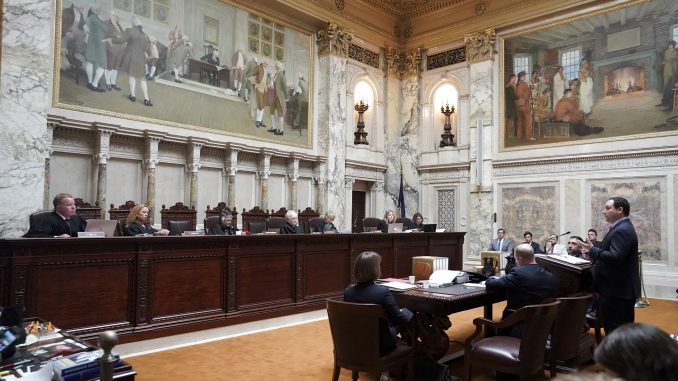
MADISON, Wis. — A divided Wisconsin Supreme Court ruled Tuesday that a judge’s decision to become Facebook friends with a woman whose child custody case he was hearing created at least the appearance of bias, the first case of its kind in the state and one that could test the boundaries of social media use by judges.
The case presented the question of whether a judge can violate due process rights by becoming friends with someone on Facebook. That hasn’t been addressed yet by the U.S. Supreme Court, making the case one it may want to take up, said attorney Brandon Schwartz.
“Social media is obviously not going away,” said Schwartz, who represented the mother fighting for custody of her child. “It would be an opportunity to provide some guidance by the U.S. Supreme Court to all of the courts across the country.”
The ruling was the latest in a series of examples across the country where a judge’s actions on social media call into question their ability to fairly consider cases before them. For example, two years ago the Florida Supreme Court said judges could be Facebook friends with attorneys.
Schwartz said the Wisconsin case was the first case of its kind where a violation of due process rights was alleged because of a judge becoming friends with someone on Facebook.
“It’s an issue the U.S. Supreme Court may have an interest in,” he said.
In Tuesday’s ruling, the court determined that “the extreme facts of this case rebut the presumption of judicial impartiality,” a due process violation. Justice Annette Ziegler also used the case to “strongly urge” Wisconsin judges to “weigh the advantages and disadvantages of using electronic social media like Facebook.”
“I am concerned that no matter how cautious and attentive the judge may be, a judge who uses electronic social media may expose both the judge and the judiciary as a whole to an appearance of bias or impropriety,” she wrote as part of the 4-3 majority.
But Justice Brian Hagedorn, in a dissent, said even though the case involves social media, “an area comparatively unexplored in judicial ethics circles,” the facts are rather ordinary and the judge’s actions did not violate the due process rights of the father as he fought for custody rights. There’s not enough evidence to show whether the Facebook friendship unfairly influenced the judge, Hagedorn said.
“Judges are people too,” Hagedorn wrote. “The very concept of an impartial judiciary depends upon the belief that judges can manage through their biases, news feeds, political supporters, former co-workers, and neighbors to render decisions without fear or favor to any party.”
The case began in 2016 when Angela Carroll filed a motion in Barron County to adjust a custody arrangement she had reached with her son’s father, Timothy Miller. She argued Miller had abused her, an accusation Miller denied.
Three days after Carroll and Miller submitted their final written arguments in 2017, the judge handling the case, Barron County Circuit Judge Michael Bitney, accepted a Facebook friend request from Carroll.
Carroll proceeded to “like” 16 of the judge’s posts, “loved” two of them and commented on two of them. The bulk of Carroll’s reactions to Bitney’s posts were “likes” to prayers and Bible verses that he posted. None of the posts were directly related to the pending custody case. However, she also shared or liked several third-party posts that were related to domestic violence, an issue that was contested at the hearing, the court ruling said.
The judge never disclosed the Facebook friendship. He also did not like or comment on any of Carroll’s posts and didn’t reply to her comments. He didn’t deny reading them, however.
“Carroll was effectively signaling to Judge Bitney that they were like-minded and, for that reason, she was trustworthy,” Justice Rebecca Dallet wrote for the majority.
A month later Bitney ruled that Miller had abused Carroll, gave her sole custody and physical placement of their son and ordered a review of Miller’s child support obligations.
After the Facebook friendship was discovered, Miller asked the judge to reconsider his ruling.
The judge said he was impartial, noting that he had simply accepted her friendship but did not “like” or comment on any of her posts. He also said that he had already decided on his ruling prior to accepting her Facebook friend request.
No “reasonable person … would seriously call into question the court’s objectivity or impartiality,” the judge said.
A state appeals court later ruled in Miller’s favor, saying the judge’s actions created a substantial risk of bias resulting in the appearance of partiality. It ordered that the custody case proceed with a different judge and the Wisconsin Supreme Court on Tuesday agreed.



